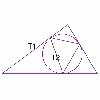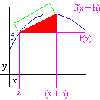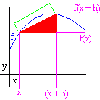Limits
-
 problemFavouriteDraw three equal line segments in a unit circle to divide the circle into four parts of equal area.
problemFavouriteDraw three equal line segments in a unit circle to divide the circle into four parts of equal area. -
 problem
problemResistance
Find the equation from which to calculate the resistance of an infinite network of resistances. -
 problem
problemTriangle Incircle Iteration
Keep constructing triangles in the incircle of the previous triangle. What happens? -
 article
articleFractional Calculus I
You can differentiate and integrate n times but what if n is not a whole number? This generalisation of calculus was introduced and discussed on askNRICH by some school students.
-
 article
articleFractional Calculus II
Here explore some ideas of how the definitions and methods of calculus change if you integrate or differentiate n times when n is not a whole number.
-
 article
articleFractional Calculus III
Fractional calculus is a generalisation of ordinary calculus where you can differentiate n times when n is not a whole number.
-
 problemFavourite
problemFavouriteWitch of Agnesi
Sketch the members of the family of graphs given by $y = a^3/(x^2+a^2)$ for $a=1, 2$ and $3$.
-
 problemFavourite
problemFavouriteConverging Product
In the limit you get the sum of an infinite geometric series. What about an infinite product (1+x)(1+x^2)(1+x^4)... ? -
 problemFavourite
problemFavouriteRain or Shine
Predict future weather using the probability that tomorrow is wet given today is wet and the probability that tomorrow is wet given that today is dry.
-
 problem
problemOver the Pole
Two places are diametrically opposite each other on the same line of latitude. Compare the distances between them travelling along the line of latitude and travelling over the nearest pole.
